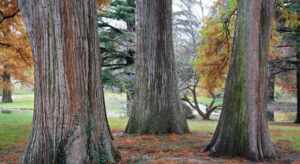
The Patient Giants: 5 Slowest Growing Trees in the Maryland-Virginia Area
In a world that often seems to be moving at an ever-accelerating pace, there’s something comforting about the slow and steady growth of trees. In a previous blog on TitanTreeCare.org, we delved into the world of the fastest-growing trees, highlighting their quick canopy coverage and other advantages. Today, we’re going to take a different approach and celebrate the patient giants of the plant kingdom – the five slowest growing trees you can find in the Maryland-Virginia area.
While fast-growing trees have their merits, slow-growers offer unique benefits that can enhance your landscape in various ways. Let’s explore these remarkable trees and discover why patience truly pays off in the world of arboriculture.
- American Holly (Ilex opaca)
American Holly is known for its iconic evergreen foliage and vibrant red berries that adorn its branches during the winter months. While this tree may take its time to grow, it rewards your patience with year-round beauty and a habitat for wildlife. Its slow growth allows for better shaping and maintenance in your landscape.
- Eastern Red Cedar (Juniperus virginiana)
Eastern Red Cedar is a native coniferous tree that can live for centuries. Although it might not seem to grow much in a year, its dense foliage provides excellent privacy screening, windbreaks, and a natural habitat for birds. Its wood is also highly durable, making it a valuable resource in the long run.
- American Beech (Fagus grandifolia)
American Beech trees are majestic additions to any landscape, known for their smooth, silver-gray bark and elegant, ovate leaves. These trees are worth the wait, offering shade, beauty, and a refuge for native wildlife.
- Eastern Hemlock (Tsuga canadensis)
Eastern Hemlocks are conifers that grace the landscape with their graceful drooping branches and dense, dark green foliage. They excel in creating a serene and cool atmosphere in your garden. They are also crucial for soil conservation along riverbanks.
- Eastern White Pine (Pinus strobus)
Eastern White Pines, the largest pine species in the eastern United States, are known for their long, slender needles and tall, straight trunks. While they may take some time to reach their full height, they make excellent windbreaks, privacy screens, and their soft needles provide a lush carpet of green beneath their canopy.
You may be asking yourself why your landscape needs a slow-growing tree, so let’s explore a few benefits of these options:
- Longevity: Slow-growing trees tend to have longer lifespans, ensuring that your investment in them pays off for generations to come.
- Low Maintenance: Their gradual growth often means less pruning and maintenance, making them ideal for homeowners looking for low-effort landscaping.
- Aesthetic Appeal: Slow-growers often develop unique shapes and characteristics that add aesthetic value to your property.
- Wildlife Habitat: These trees provide essential habitats for birds, insects, and other wildlife, promoting biodiversity in your area.
- Stability and Shade: Slow-growing trees tend to have strong, deep root systems that offer stability to the soil and provide long-lasting shade.
While fast-growing trees have their place in landscaping, the slow-growing trees bring a sense of enduring beauty and ecological richness to your outdoor space. Whether you want to create a serene garden, enhance privacy, or support local wildlife, these patient giants are worth the wait.
If you’re interested in learning more about trees for your yard, be sure to check out our previous blog on TitanTreeCare.org, which explores the benefits of fast-growing trees. Combining the strengths of both slow and fast-growers can create a harmonious and sustainable landscape that you’ll enjoy for years to come. And as always, if you need some professional input, give us a call and schedule an appointment with our ISA Certified Arborist.
Get a Quote
Looking for expert tree care? Fill out the form below and we’ll be in touch!
Looking for expert tree care?

